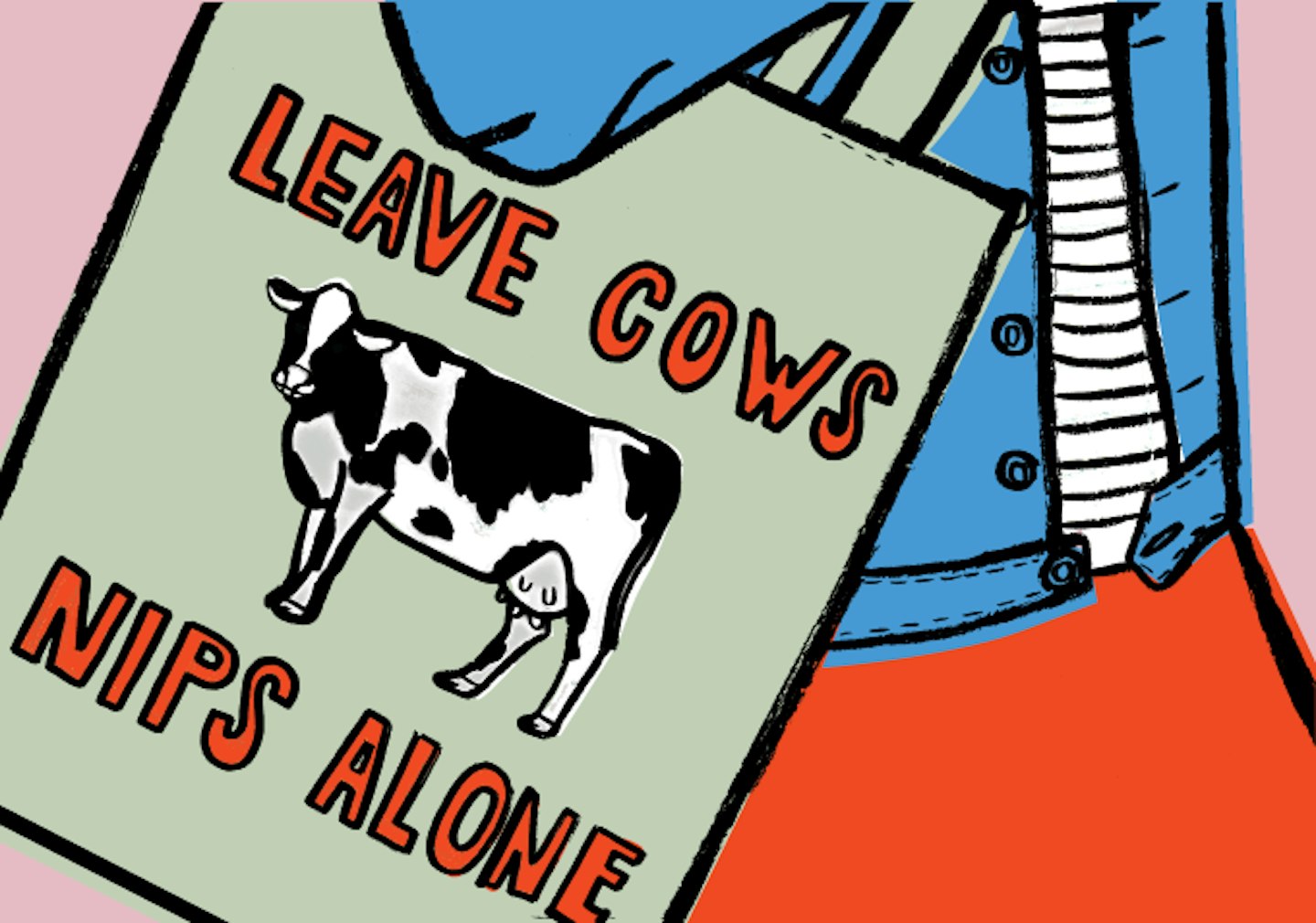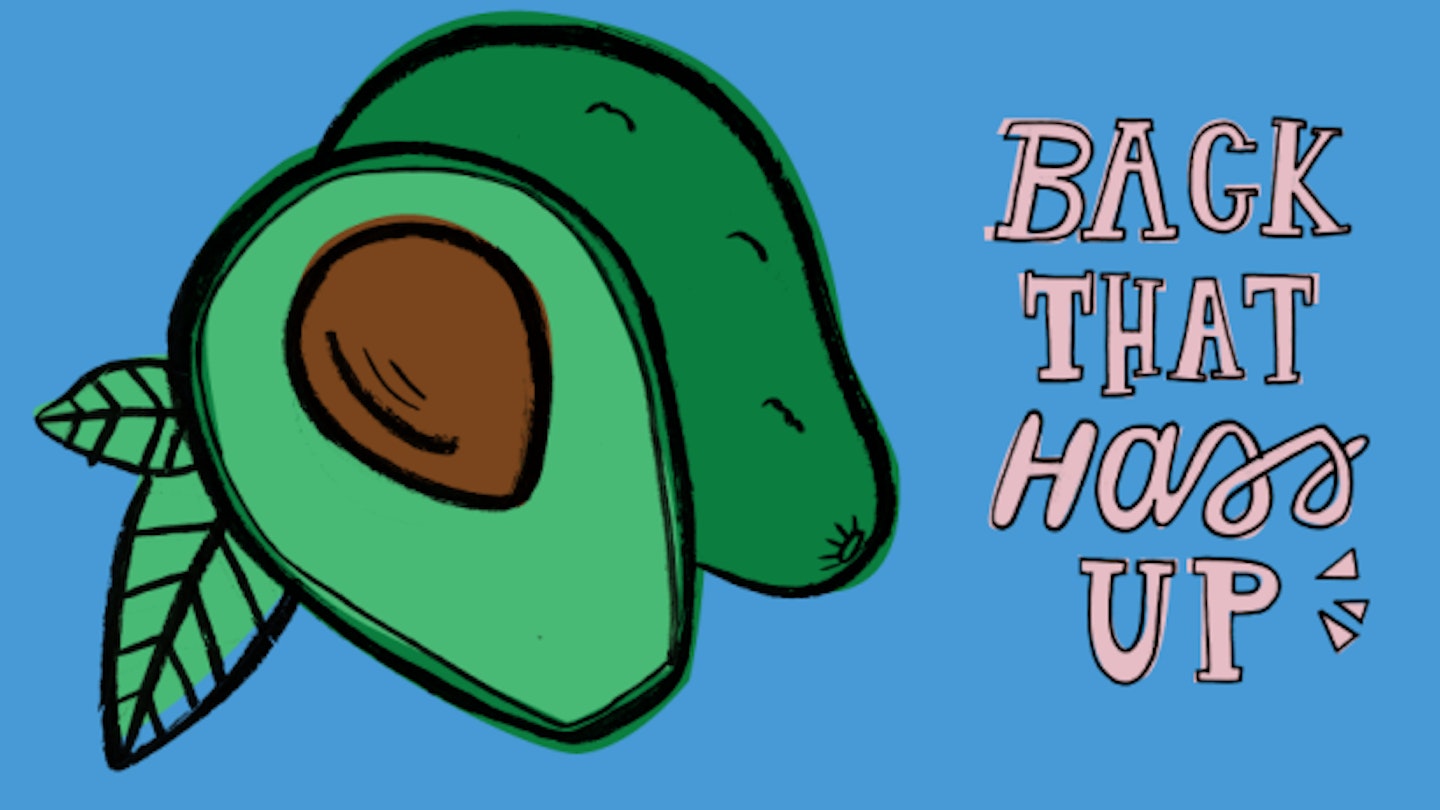Ten years ago, there were an estimated 150,000 vegans in the UK, and while the latest stats haven’t been released yet*, it’s believed this number will have risen significantly. Google searches for ‘vegan’ have doubled since 2011, and recently climbed above ‘vegetarian’ for the first time ever. Veganism appears to go hand in hand with ‘clean eating’ and you can’t move for celebrities from Beyoncé to Leonardo DiCaprio extolling the benefits of a diet free from animal products.
Though I try to minimise the amount of animal products I eat as much as I possibly can, I often cave because steak and Nando’smedium spice chicken pitta both exist. And I have a terrible habit of eating massive chunks of cheddar from the fridge after a few glasses of white wine too many. Still, I can’t help but feel guilty, especially when watching documentaries like Cowspiracy, which lay the blame for most of the world’s environmental problems at the feet of the animal agriculture industry. And it seems you can’t open a newspaper without seeing a scary article about bacon sandwiches giving you cancer. But then again, being vegan seems so difficult, and how is me going vegan going to actually have any real impact on the environment? To ease my confusion, I spoke to two experts – Jimmy Pierce from the Vegan Society and Frida Harju, nutritionist at health app Lifesum, about becoming a herbivore.
So, how does eating meat damage the environment?
Watching Cowspiracy: the Sustainability Secret (which is available to view on Netflix), you get hit with a load of alarming facts. For example, the film says livestock and their by-products account for 51% of all worldwide greenhouse gas emissions and animal agriculture is responsible for around 90% of Amazon rainforest destruction.
But are these claims true? It seems that it’s not as extreme as it looks but animal agriculture does have a massive impact on the environment and is a leading driver of climate change. A 2006 report by the United Nations, Livestock’s Long Shadow, found livestock are responsible for 18% of greenhouse gas emissions – a bigger share than that of transport. And six years later, a UN Environment Programme report cited a range of estimates for emissions from animal agriculture as 10-35% of total global emissions. Jimmy Pierce, who has completed work relating to environmental impacts of meat farming says 80% of Brazilian deforestation is due to cattle ranching – not far off Cowspiracy’s claims.
But aren’t things like soy also harming the environment? That’s a common counter-argument to veganism I’ve heard. ‘Most soya beans are actually grown to feed farmed animals – 5.6 million acres in Brazil alone,’ Pierce says. ‘Compared to the amounts produced for animals, the amount for humans is negligible.’ Overall, if everybody became vegan this would still not damage the environment anywhere near the level that farming animals has done, as plant-based farming uses less emissions and resources such as water. However, if you’re thinking of going vegan you can make further ethical choices if this worries you, eating pulses and chickpeas over tofu.
If I go vegan, will that personally actually impact the environment in any way?
So I’ve seen the scary stats, but really what can one person do to help if most people are still going to be tucking into burgers anyway? Jimmy Pierce says you actually will have a small impact – and will significantly reduce your own carbon footprint. ‘A meat eater is responsible for seven times more greenhouse gas emissions than a vegan,’ he says. A plant-based diet also requires only a third of the land needed to support a carnivore’s intake.

So what about your health - what does a vegan diet actually do to your body?
Vegans tend to be slimmer and have healthier BMIs compared to meat-eaters. ‘Most of them aren’t at any risk of becoming obese, as if you’re a vegan you’ll tend to eat ‘clean’ foods,’ Frida Harju says. Avoiding saturated fat - which carries a massive risk of heart disease - is a big plus for going vegan. While this tends to be found in meat and dairy foods in significant amounts, plant-based items are generally lower in fat and don’t contain cholesterol. ‘A good vegan diet will contain healthy fats, such as seeds, nuts and avocados,’ Harju says. Eating these products can also give you really nice, clear skin, something Harju has seen among her vegan clients. Many vegans also say they’ve noticed they have a lot more energy and are less susceptible to colds and flu since taking the plunge.
The main benefit of going vegan for your health is massively reducing your cancer risk. In October 2015 the World Health Organisationreleased a report saying eating 50g of processed meat a day (that’s approximately two rashers of bacon) can increase your risk of bowel cancer by 18%. Cooking meat at high temperatures, such as on a barbecue, also creates carcinogenic chemicals.
While the WHO stressed the health benefits of meat, such as high iron and protein content, they did advise that people use this information to cut down on their carne consumption. The NHS has good tips on doing this here.
But isn’t it possible to be a vegan and be really unhealthy?
When one of my friends went vegan a few years ago for an article for our university paper, she ended up basically living off chips and Wasabi tofu curry and rice for ages – and felt pretty sluggish, hangry and knackered for pretty much the entire time. ‘I’d recommend anyone considering a vegan diet to do their research first and plan a few healthy recipes to try,’ Frida Harju says. ‘It’s easy to pick things like deep-fried falafel (which can be OK as part of a balanced diet) for ease, which is going to be really bad for you in the long term as you will lack essential vitamins and minerals.’
The main deficiency associated with a vegan diet is vitamin B-12, an essential vitamin for your brain and nervous system. This only comes from animal products, and if you don’t get enough of this you’re opening yourself up to a whole host of nasty health problems, including tingling hands and feet, fatigue, pins and needles and memory problems. Some of these can be irreversible too. ‘A lot of vegan food is fortified with this vitamin nowadays,’ Harju says. ‘Look on the labels and pick items which have this. Rice milk and almond milk are good examples of products which are enriched with B-12.’ You can also pick up B-12 supplements in most chemists.
While some of the omega-3 fatty acids are found in chia and flax seeds, EPA and DHA, which have essential roles to play in terms of heart, brain and eye health, as well as reducing inflammation, are generally absorbed into the body by eating oily fish such as mackerel. Again, try looking for vegan supplements in your local chemist.
Many vegans get asked about where they get their protein from, but it’s a myth that you can only get it from meat and eggs. Harju says that good sources are tofu (obviously), quinoa, black beans, lentils and spinach.
And it’s definitely not really expensive to go vegan?
Adopting a vegan diet doesn’t necessarily mean strolling into your nearest Whole Foods and spending the best part of a tenner on an acai bowl. ‘A lot more students are going vegan, with cost-cutting being a key factor,’ Jimmy Pierce says.
He tells me about a piece he wrote for the Independent comparing staple student foods containing meat to vegan alternatives. Some of the savings were eye-opening, for example making chicken fajitas will cost you £4, whereas going for a tin of mixed beans for your wrap instead will only set you back 60p. That’s more of your loan left over for Jägerbombs and Topshop jeans.
But is it really hard to go vegan?
Times are changing to meet customer demand. You can now pop to your local Tescoto buy vegan productsrather than finding a specialist, pricey health shop – for example, almond milk sales are growing at a rate of 70% to 80% year-on-year, with most supermarkets doing their own-brand versions. Hey, it's 2016, you can makevegan banana milk now. There's even such thing as pea milk! There are vegan restaurants popping upereewhere or if you fancy something more low-key - many chain restaurants do vegan options too – so you can still use that tempting Pizza Express voucher or even have a cheeky Nando’s (get the veggie wrap and hold off on the halloumi). If you find yourself at a restaurant and you have no idea what to order, give ourvegan guide to ordering fooda skim through.
You can even go wild and have a chocolate egg shell bowl for breakie on Easter morning, courtesy ofthese completely vegan Easter eggs(which we have already tried and tested for you, dw).
The Vegan Societyis also at hand to help navigate you through the hardest first few weeks. ‘I’d recommend people take our 30-day pledge if they are planning to go vegan,’ Jimmy Pierce says. ‘Our organisation recognises that it can be difficult, and there’s not a one-size fits all approach for people. This is a really helpful way of doing it.’ If you sign up to the pledge you’ll get advice, recipe ideas and tips for speaking to friends and family about your decision. It’s successful – 93% of people who take it remain vegan long-term.
However, if you still struggle, you don’t have to beat yourself up for it. Frida Harju recommends a ‘flexitarian’ approach, where you mostly stick to a vegan diet but if you’re at a wedding or on holiday in a country where veganism is an alien concept, or even if you’ve had a bad day and just fancy tucking into a steak then you can relax the rules a little bit. ‘That way you are still basically maintaining a healthy, environmentally-friendly diet, but it’s a good compromise,’ she says. So it seems you can have your (beef) cake and eat it too.
Right so veganism is for me... what do I start?
We have already done the extensive leg work for you and have made some delish recipes, which taste* even* better than their sexy counterparts. We give you.... DUN DUN DUN...a banging toad in the hole, tasty butter chicken, sweet potato casserole, insta-worthy fish and chips, a barbeque, magnificent Ikea-inspired meatballs, burgers, fluffy pancakes and eeeeeven a fry up. All vegan. Hallelujah.
We also recommend bookmarking these vegan blogs, for some plant-based meal inspo that even health kweeen Gwyneth Paltrow will drool over. Even Pinterest has your back, hun with these uh-mazing vegan recipes for you to try.
Remember guys, it's not just food choices, but also fashion ones as well. These are many affordable, yet ethical clothing brands out thereand these are the best vegan-friendly bootsyou can buy, that won't break before you've even had a chance to check your morning emails.
Like this? Then you might also be interested in:
13 Things You Need To Know About Being An Ethical Vegetarian [
**Follow Natasha on Twitter **@tash_wynarczyk@tash_wynarczyk
This article originally appeared on The Debrief.
